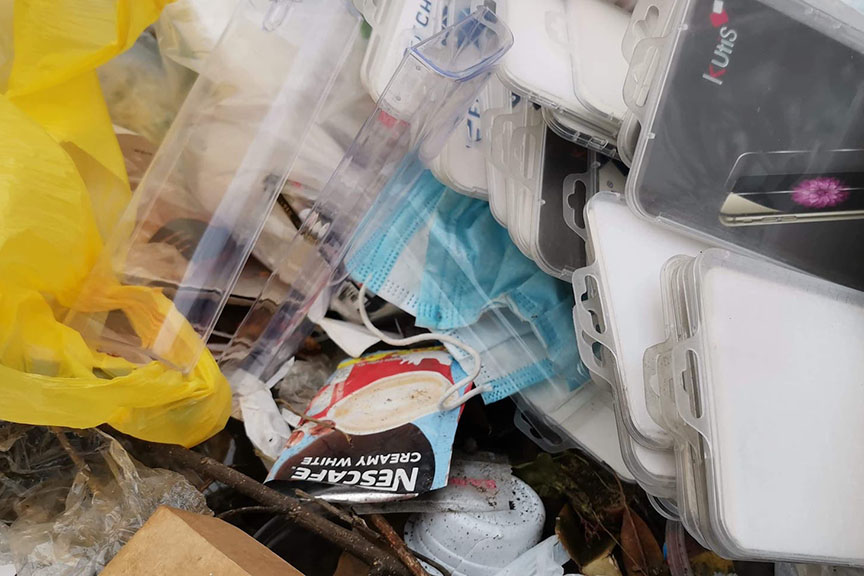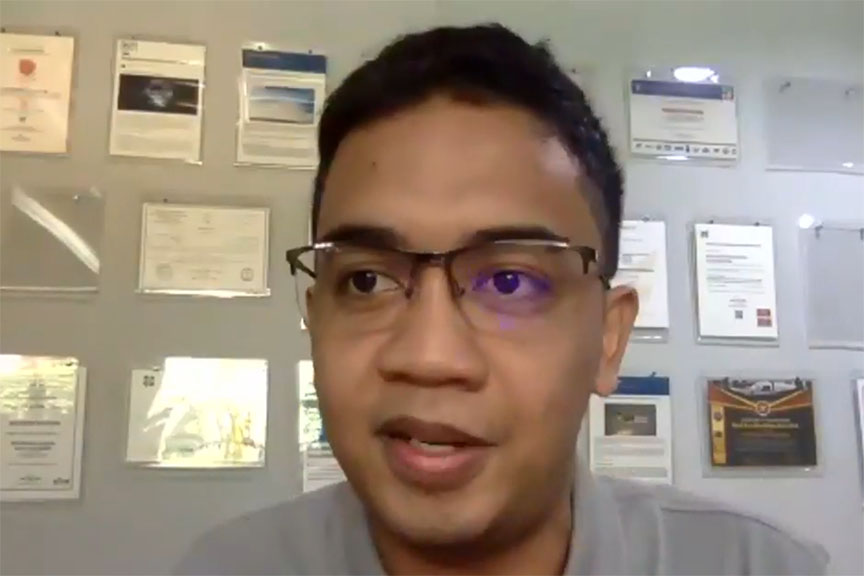DAVAO CITY (MindaNews / 25 Aug) – The volume of medical wastes being thrown away in Davao Region has increased over the past three months amid the raging coronavirus disease (COVID-19) outbreak, according to an executive of RAD Green Solutions Corporation, which treats 50 tons of used personal protective equipment (PPE) a month with its bio-medical waste treatment technology called Pyroclave situated in New Carmen, Tugbok District here.
 Used face masks thrown into a household trash bin. MindaNews file photo by JOEL ESCOVILLA
Used face masks thrown into a household trash bin. MindaNews file photo by JOEL ESCOVILLA
Engr. Neil Anthony Jamili, research and development manager of RAD Green Solutions Corporation, said that around 80 percent, or equivalent to 40 tons, of the medical wastes that the Davao-based company collected was composed of infectious wastes from all COVID-19 facilities in the region.
“The medical waste is transported to us in yellow bags. After the treatment, it’s already considered as general municipal waste, so it is placed now in black bags and considered to be thrown at landfill but in a separate section or area, which is for medical waste,” Jamili said during Monday’s online forum on “Where Do Our Disposable PPEs Go? Assessing waste management in the time of COVID-19” organized by MindaNews in partnership with Internews and Earth Journalism Network.
One set of PPE includes closed shoes, shoe cover, apron, long-sleeved gown, thick gloves, face masks, and goggles or face shield.
Jamili said in the forum broadcast over Zoom and Facebook Live that these medical wastes were immediately processed at the Pyroclave, a non-burn and non-incineration technology employing “pyrolysis that utilizes extreme thermal treatment to process medical wastes.”
“That’s still very, very small considering that according to [the World Health Organization], hospital beds are generating one-half kilogram of hospital waste per bed per day. Imagine because of the pandemic, PPEs are also rising in usage. So for sure, there are more wastes that have to be collected,” he added.
He said that this technology has become even more relevant in the country, which is confronting a problem on infectious waste disposal while the nation deals with the COVID-19 pandemic.
Jamili added that the company is also present in seven other areas in the country: Metro Manila, Naga City and Albay in Bicol Region, Tacloban City in Eastern Visayas, Koronadal City and Sarangani in Soccsksargen, and Marawi in the Bangsamoro Autonomous Region in Muslim Mindanao. Pyroclave’s latest facility in Davao de Oro in the region is currently undergoing certification with the Department of Environment and Natural Resources.
 Engr. Neil Anthony Jamili, of RAD Green Solutions Corporation, during the online forum.
Engr. Neil Anthony Jamili, of RAD Green Solutions Corporation, during the online forum.
The combined medical wastes processed in all Pyroclave facilities across the country would hit around 500 tons a month, he added.
Engr. Antonietta Ebol, Decontamination / Water Sanitation and Hygiene Team Leader of DOH-Davao Region, said the increasing COVID-19 cases jacked up the wastes generated from COVID-19 facilities, including hospitals and temporary treatment and monitoring facilities (TTMF).
She added that most local government units in the region have no designated treatments, storage, and disposal facilities for infectious wastes.
Ebol said that all health care facilities and TTMFs should have a waste management plan in place.
“All health care waste generated in the management and treatment of suspect, probable and confirmed COVID patients should be considered as infectious waste. All PPEs used for the disinfection of non-critical medical items and environment shall be considered as infectious waste which shall be properly treated prior to disposal and in accordance with healthcare waste management policies and procedures,” she said.
She added that even residents must follow the proper disposal of non-reusable facemasks by sanitizing and then separating them from general household wastes.
Environment-friendly
Jamili debunked myths that Pyroclave may be detrimental to the environment, explaining that it is a safe method to treat infectious wastes through a process called pyrolysis, a “thermo-chemical decomposition of organic material at higher temperatures in the absence of oxygen typically occurring under pressure and at an operating temperatures above 430 degree Celsius.”
“They always say that pyrolysis is the facade of incineration. However, it is not. According to the guidelines of UN Conference for Environment and Development, there are no direct statements coming from them that pyrolysis is an indirect form of incineration,” he added.
Jamili said that the RAD Green Solutions complied with emission standards of the government’s regulatory agencies, particularly of the Department of Health and Environmental Management Bureau of the Department of Environment and Natural Resources.
“We have to pass all emission standards before we treat medical waste and also it’s compliant with DOH Healthcare Waste Management Manual, which is the mandate that we are currently following in terms of the disposal of medical waste, which include the COVID waste and others that we actually cater,” he said.
Jamili added that the company commissions a third party laboratory annually to test air and stock samples which will be sent to Singapore and US for testing of dioxins and furans, known as human carcinogens.
“RAD Green and Pyroclave do not support incineration, so we believe that incineration is a major no-no to the country because dioxins and furans are carcinogens, and we don’t want Dabawenyos to suffer from cancer because of disposal of these wastes,” he added. (Antonio L. Colina IV / MindaNews)